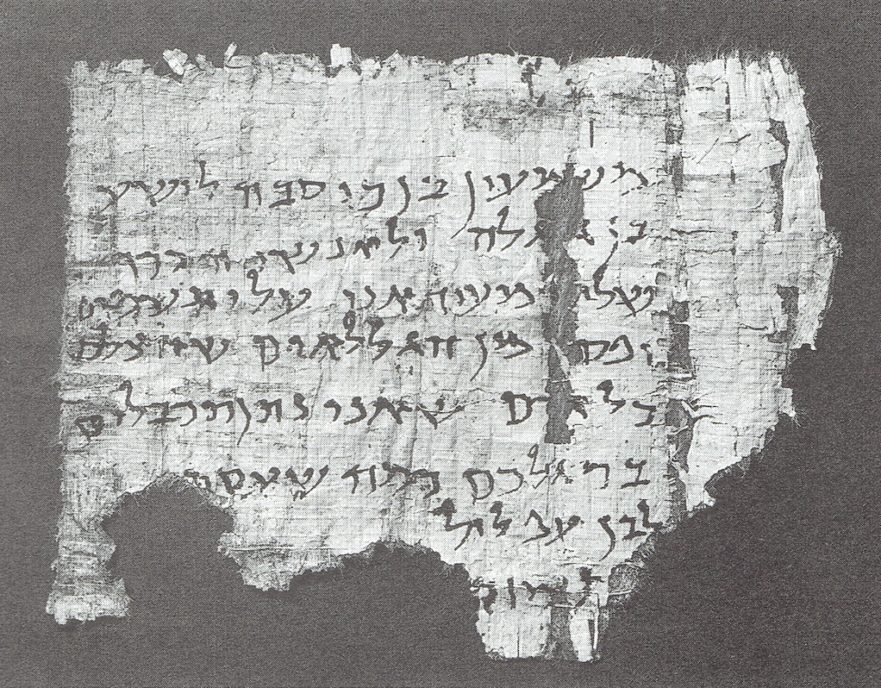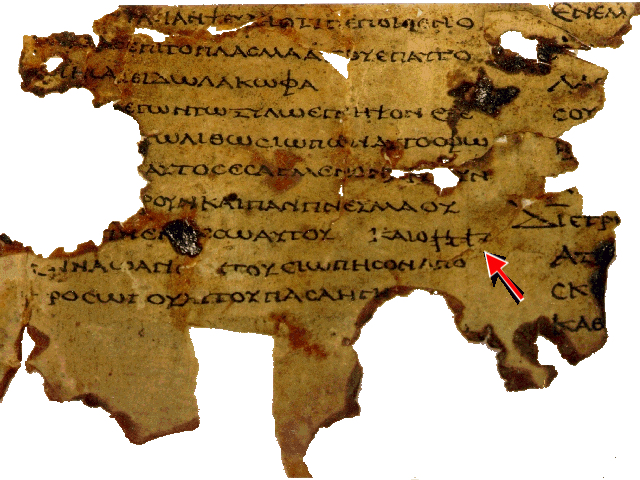In translating the Greek texts of the Gospels into Hebrew, Dr. Lindsey found that many passages could be rendered literally with almost no change of word order. The result was a Hebrew version that often sheds fascinating light on the meaning of Jesus’ words, so much so that Lindsey came to believe the Greek sources Matthew, Mark and Luke used were rendered very literally from Hebrew originals. This Hebraic perspective sometimes explains Gospel passages that have long been considered difficult or ambiguous. In the following article, Lindsey presents one example of what has been considered a uniquely idiosyncratic expression of Jesus, but which a Hebraic perspective reveals to be a familiar phrase from the Scriptures.
Hebraisms in the New Testament

The text of the New Testament contains many Semitic elements, some of which are Hebraisms. The Synoptic Gospels show evidence for the existence of wordplays and idioms that are typical of Hebrew.
I happily stand corrected!
After reading my “Jehovah, A Christian Misunderstanding” article, a Jerusalem Perspective Member provided several impressive references, pointed out that the Christian reading “Jehovah” can be traced to Raymond Martin’s Pugeo Fidei (1270 A.D.), and may have originated much earlier, even as early as the ninth century!
Cataloging the Gospels’ Hebraisms: Part Six (Parallelism)

In this article, we will discuss the second type of parallelism: Antithetical Parallelism.
Cataloging the Gospels’ Hebraisms: Part Five (Parallelism)

Parallelism is a central feature of Hebrew poetry. It permeates the words of biblical poet and prophet. The frequency with which parallelism occurs in the utterances of Jesus is surprising, and leads inevitably to the conclusion that the Greek source (or, sources) used by the authors of Matthew, Mark and Luke derive(s) from a Greek translation (or, translations) of Hebrew documents.
Cataloging the Gospels’ Hebraisms: Part Four (Parallelism)

Doubling, or repeating, is a characteristic feature of Hebrew. Hebrew loves to say things twice (or more!) by adding equivalents. Words, phrases, sentences, and even stories, are doubled (or tripled).
Cataloging the Gospels’ Hebraisms: Part Three (Impersonal “They”)

Awareness of even the simplest Hebrew grammatical structure can bring to life a vague, or difficult-to-understand, saying of Jesus. Since potential Hebrew idioms are so dense in the Greek texts of Matthew, Mark and Luke, one has to ask, Could these apparent Hebrew idioms be evidence that the synoptic Gospels are descendants of an ancient translation of a Hebrew “Life of Jesus,” the gospel that the church father Papias spoke of when he wrote: “Matthew…arranged the sayings [of Jesus] in the Hebrew language”?
Cataloging the Gospels’ Hebraisms: Part Two (Luke 9:51-56)

Relatively few of the suggested Semitisms underlying the Greek New Testament constitute clear-cut proof for a Hebrew undertext, but a high density of Hebraisms in a given passage increases the probability that it is “translation Greek.”
Jesus and the Enigmatic “Green Tree”

Jesus made bold messianic claims when he spoke. To thoroughly understand these claims, however, we must get into a time machine and travel back in time to a completely different culture, the Jewish culture of first-century Israel. We must acculturate ourselves to the way teachers and disciples in the time of Jesus communicated through allusions to Scripture.
The Value of Rabbinic Literature as an Historical Source

The thesis of this article is that rabbinic sources, when used in a careful manner, can provide reliable historical material pertaining to the Second Temple period. If this thesis is accepted, the consequences for the study of the New Testament Gospels are obvious.
Why Learn to Speak a Dead Language?
Why would anyone in his or her right mind want to speak a “dead” language, a language that no one speaks? The answer: Because only by speaking a language does one internalize it, and it was high time, Randall and I felt, having tasted fluency in Hebrew, that we should gain an active knowledge of Koine Greek.
What’s Happening to the Holy Tongue?
English speakers who live in Israel are reminded regularly of the inroads English is making in Hebrew.
Hebrew or Aramaic? Some Evidence from Inscriptions

The fundamental assumptions of the past of Jesus’ mother tongue are again and again repeated today while their frame of reference has changed dramatically.
Hebrew as a Spoken Language in First-century Israel

Hebrew was a living language in first-century Israel, part of a multilingual environment (Hebrew, Aramaic and Greek).
The Amidah Prayer

The Amidah is the essential part of the morning, afternoon and evening weekday services in the synagogue. Every Jew is religiously obligated to pray the Eighteen Benedictions daily.
Jehovah and PIPI

According to Jerome, those who were unfamiliar with Jewish customs tried to pronounce the Hebrew letters as if they were Greek letters. The result was quite a howler: they pronounced YHVH as PIPI!
What is the significance of the two Greek words for “love” in John 21:15-17?

Does Hebrew have two words that would differentiate between the love of Christ for Peter and Peter’s love for Christ?
Hananiah Notos: The Never-ending Importance of the Dead Sea Scrolls
One of the recently published Dead Sea Scroll documents is known as the “Register of Rebukes.” Only parts of eleven lines of a column of this document have survived. However, even these few words and parts of words are enough to see that the document, or a portion of it, was a list of the sect’s members who were rebuked because they had violated community laws.

